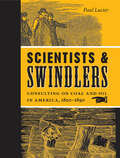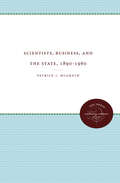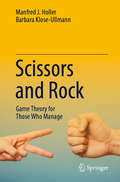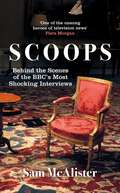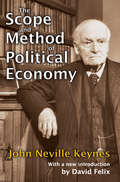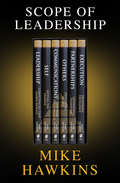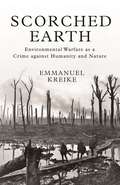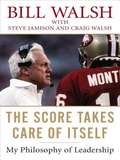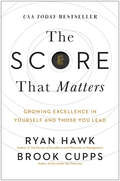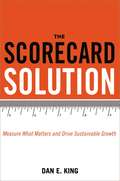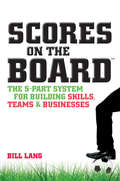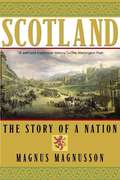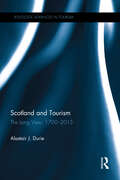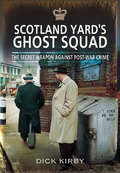- Table View
- List View
Scientists and Swindlers: Consulting on Coal and Oil in America, 1820–1890 (Johns Hopkins Studies in the History of Technology)
by Paul LucierIn this impressively researched and highly original work, Paul Lucier explains how science became an integral part of American technology and industry in the nineteenth century. Scientists and Swindlers introduces us to a new service of professionals: the consulting scientists. Lucier follows these entrepreneurial men of science on their wide-ranging commercial engagements from the shores of Nova Scotia to the coast of California and shows how their innovative work fueled the rapid growth of the American coal and oil industries and the rise of American geology and chemistry. Along the way, he explores the decisive battles over expertise and authority, the high-stakes court cases over patenting research, the intriguing and often humorous exploits of swindlers, and the profound ethical challenges of doing science for money.Starting with the small surveying businesses of the 1830s and reaching to the origins of applied science in the 1880s, Lucier recounts the complex and curious relations that evolved as geologists, chemists, capitalists, and politicians worked to establish scientific research as a legitimate, regularly compensated, and respected enterprise. This sweeping narrative enriches our understanding of how the rocks beneath our feet became invaluable resources for science, technology, and industry.
Scientists and Swindlers: Consulting on Coal and Oil in America, 1820–1890 (Johns Hopkins Studies in the History of Technology)
by Paul LucierAn “insightful” account of the early fossil fuel industry, the rise of the professional consultant, and the nexus between science and money (Technology and Culture).In this impressively researched, highly original work, Paul Lucier explains how science became an integral part of American technology and industry in the nineteenth century. Scientists and Swindlers introduces us to a new service of professionals: the consulting scientists. Lucier follows these entrepreneurial men of science on their wide-ranging commercial engagements from the shores of Nova Scotia to the coast of California and shows how their innovative work fueled the rapid growth of the American coal and oil industries and the rise of American geology and chemistry. Along the way, he explores the decisive battles over expertise and authority, the high-stakes court cases over patenting research, the intriguing and often humorous exploits of swindlers, and the profound ethical challenges of doing science for money. Starting with the small surveying businesses of the 1830s and reaching to the origins of applied science in the 1880s, Lucier recounts the complex and curious relations that evolved as geologists, chemists, capitalists, and politicians worked to establish scientific research as a legitimate, regularly compensated, and respected enterprise. This sweeping narrative enriches our understanding of how the rocks beneath our feet became invaluable resources for science, technology, and industry.
Scientists, Business, and the State, 1890-1960 (The Luther H. Hodges Jr. and Luther H. Hodges Sr. Series on Business, Entrepreneurship, and Public Policy)
by Patrick J. McGrathIn the late nineteenth century, scientists began allying themselves with America's corporate, political, and military elites. They did so not just to improve their professional standing and win more money for research, says Patrick McGrath, but for political reasons as well. They wanted to use their new institutional connections to effect a transformation of American political culture. They succeeded, but not in ways that all scientists envisioned or agreed upon. McGrath describes how, between 1890 and 1960, scientific, business, and political leaders together forged a new definition of American democracy in which science and technology were presented to the public as crucial ingredients of the nation's progress, prosperity, and political stability. But as scientists became more prominent, they provoked conflicts among themselves as well as with their institutional patrons over exactly how their expertise should be used. McGrath examines the bitter battles that erupted over the role scientists should play during the Great Depression, World War II, the Cold War arms race, and the security and loyalty investigations of the 1950s. He finds that, by the end of the 1950s, scientists were regarded by the political and military elite not as partners but as subordinate technicians who were expected to supply weapons on demand for the Cold War state.Originally published 2001.A UNC Press Enduring Edition -- UNC Press Enduring Editions use the latest in digital technology to make available again books from our distinguished backlist that were previously out of print. These editions are published unaltered from the original, and are presented in affordable paperback formats, bringing readers both historical and cultural value.
Scissors and Rock: Game Theory for Those Who Manage
by Manfred J. Holler Barbara Klose-UllmannThis book introduces readers to basic game theory as a tool to deal with strategic decision problems, helping them to understand the complexity of such problems – to extract a solution, if possible – and to manage the complexity by revising the game if appropriate. The authors discuss basic decision situations modeled as Prisoners’ Dilemma, Chicken Game, and Stag Hunt Game, as well as concepts like the Nash equilibrium, Trembling Hand Perfectness, Rationalizable Strategies and the Theory of Moves to introduce game theoretic thinking. Further, the book presents pioneers of strategic thinking, e.g., Sun Tzu, Machiavelli, Adam Smith, and Goethe, and includes cases of conflict and cooperation to illustrate practical applications. Readers learn to apply game theory in business and in daily life – to manage their decision problems and to better understand the decision problems of others.
Scoops: Behind the Scenes of the BBC's Most Shocking Interviews
by Sam McAlister&‘Riveting&’ Sunday Telegraph &‘Behind every great interview is a great booker – Sam McAlister is one of the unsung heroes of television news&’ Piers Morgan She is the woman who clinched the 2019 interview with Prince Andrew, described as &‘a plane crashing into an oil tanker, causing a tsunami, triggering a nuclear explosion&’. She is many things beside: the first in her family to go to university; a trained barrister; a single mum; a master of persuasion. In her former BBC colleagues&’ words, she was the &‘booker extraordinaire&’, responsible for many of Newsnight&’s exclusives over the past decade, including Stormy Daniels, Sean Spicer, Brigitte Höss, Steven Seagal, Mel Greig and Julian Assange. After 12 years producing content for Newsnight, McAlister reflects with candour on her experience, sharing not just the secrets of how the best news gets made, but also the changes to the BBC, the future of &‘mainstream media&’ in the age of clickbait and the role of power and privilege in shaping our media landscape. This is a backstage pass to the most unforgettable journalism of our times.
Scope and Challenge of Business-to-Business Marketing
by Bruce Isaacson V. Kasturi RanganIdentifies six key linkages that distinguish business-to-business marketing; three with respect to the external environment (i.e., derived demand, complex buying process, and concentrated customer base) and three with respect to the internal organization (emphasis on technology, high level of customization, and order fulfillment mechanism), which distinguish business-to-business marketing. These linkages give rise to unique challenges in analysis and execution of marketing decisions. After these challenges are discussed the organization is explained. The three core sections, following this introductory section, reflect the product life cycle theme: Managing New Products, Managing Mature Products, and Managing Product Market Diversity.
The Scope and Method of Political Economy
by John Neville KeynesThe elder Keynes argues that almost every problem connected with the scope and method of political economy has given rise to conflict of opinion. The resulting controversies have sometimes been bitter. Those readers, who already have any acquaintance with the literature of economic method should be prepared to find that several of the chapters are controversial in character. At the same time, Keynes avoids the tone of a partisan and represents both sides of the argument without prejudice.While making no attempt to bring about a complete reconciliation between opposing views, Keynes shows the nature of the opposition between them has sometimes been misunderstood, and its extent consequently exaggerated. Since the scope and method of a science can never be satisfactorily discussed at the commencement of its study, some knowledge of political economy in its general outlines is assumed.The nature of the topics discussed in this classic is indicated in the introductory chapter. The abstract discussion of methods is one to which students of economics must necessarily give attention in the course of their reading, and its indirect bearing on the solution of practical economic questions is very close in contemporary importance in today's society.
The Scope of Business at the Base of the Pyramid: Middle and Lower Income Countries
by Tricia Gregg V. Kasturi RanganUsing World Bank data, the note defines the Base of the Pyramid population as the 4.76 billion people living on less than $10/day. It briefly reviews the perspectives of key business articles that address this market, notably C.K Prahalad's work on Bottom of the Pyramid, and Porter and Kramer's article on Creating Shared Value. The note then provides a somewhat more extensive (yet brief) review of the literature from Development Economics literature, before turning to the perspective offered by the HBS, MBA, course on Business at the Base of the Pyramid (BBOP). The note concludes with a brief statistical tour of the key needs that characterize this market segment, namely: Nutrition, Healthcare, Education, Sanitation, Clean Water & Energy, Financial Inclusion, and Affordable Housing.
The SCOPE of Leadership Book Series: Leadership, Self, Communications, Others, Partnerships, and Execution (SCOPE of Leadership Book Series)
by Mike HawkinsThe fully searchable digital box set that includes the six-book series: Leadership, Self, Communications, Others, Partnerships, and Execution.The SCOPE of Leadership six-book series outlines the competencies that great leaders who lead as coaches possess. Read this series to learn the principles of developing, enabling, and inspiring people through a coaching approach to leadership. Develop the capabilities that produce consistently outstanding results; be a leader people aspire to follow; leverage cross-functional collaboration; build trust, teamwork, and a spirit of community; increase employee engagement and loyalty; communicate with confidence; foster innovation and competitive advantage; attract, develop, and motivate top talent; sustain speed, quality, and operational excellence.The SCOPE of Leadership book series teaches how to achieve exceptional results by working through people. You will learn a straightforward framework to guide you in developing, enabling, exhorting, inspiring, managing, and assimilating people. Benefit from the wisdom of many years of leadership, consulting, and executive coaching experience. Discover how to develop the competencies that align consistently with great leadership. The SCOPE of Leadership digital box set is fully searchable between books and includes links to additional resources and content by the author.“The most comprehensive treatment of leadership I’ve ever seen by one author . . . full of insightful assessments, useful tools, and practical tips.” —Jim Kouzes, coauthor of The Leadership Challenge
Scope of the Corporation
by David J. CollisDescribes analyses that determine the appropriate limit to the scope of the firm. Examines both the production cost justification for firm diversification--economies of scope and shared resources, and the governance cost justification for including transactions inside the hierarchy rather than contracting for them on the market--transaction costs and agency theory. Concludes by identifying the line between corporate strategy and firm scope.
Scoping the Problem: Performance Challenges Facing the U.S. Health Care System
by Michael E. Porter Elizabeth Olmsted TeisbergThe U.S. health care system is on a dangerous path, with a toxic combination of high costs, uneven quality, frequent errors, and limited access to care. This chapter presents a wide array of indicators that document the range of problems confronting the system. While individual measures can be questioned for their precision or implication, these many disparate kinds of evidence, taken together, lead to the same overwhelming conclusion: the system is broken, and the magnitude of the problem is staggering.
Scorched Earth: Environmental Warfare as a Crime against Humanity and Nature (Human Rights and Crimes against Humanity #38)
by Emmanuel KreikeA global history of environmental warfare and the case for why it should be a crimeThe environmental infrastructure that sustains human societies has been a target and instrument of war for centuries, resulting in famine and disease, displaced populations, and the devastation of people’s livelihoods and ways of life. Scorched Earth traces the history of scorched earth, military inundations, and armies living off the land from the sixteenth to the twentieth century, arguing that the resulting deliberate destruction of the environment—"environcide"—constitutes total war and is a crime against humanity and nature.In this sweeping global history, Emmanuel Kreike shows how religious war in Europe transformed Holland into a desolate swamp where hunger and the black death ruled. He describes how Spanish conquistadores exploited the irrigation works and expansive agricultural terraces of the Aztecs and Incas, triggering a humanitarian crisis of catastrophic proportions. Kreike demonstrates how environmental warfare has continued unabated into the modern era. His panoramic narrative takes readers from the Thirty Years' War to the wars of France's Sun King, and from the Dutch colonial wars in North America and Indonesia to the early twentieth century colonial conquest of southwestern Africa.Shedding light on the premodern origins and the lasting consequences of total war, Scorched Earth explains why ecocide and genocide are not separate phenomena, and why international law must recognize environmental warfare as a violation of human rights.
SCORE! Educational Centers (A)
by M. Diane Burton Naomi Atkins Jeffrey L. BradachDescribes the start-up, strategy, organizational design, and operations of SCORE! Educational Centers, an after-school tutoring enterprise. Alan Tripp, founder and CEO, is faced with growing organizational stresses and a looming venture capital deadline. Examines Tripp's leadership, management style, and strategy. Focuses on the steps he takes to build the company into a viable organization.
The Score Takes Care of Itself: My Philosophy of Leadership
by Steve Jamison Bill Walsh Craig WalshThe last lecture on leadership by the NFL's greatest coach: Bill Walsh Bill Walsh is a towering figure in the history of the NFL. His advanced leadership transformed the San Francisco 49ers from the worst franchise in sports to a legendary dynasty. In the process, he changed the way football is played. Prior to his death, Walsh granted a series of exclusive interviews to bestselling author Steve Jamison. These became his ultimate lecture on leadership. Additional insights and perspective are provided by Hall of Fame quarterback Joe Montana and others. Bill Walsh taught that the requirements of successful leadership are the same whether you run an NFL franchise, a fortune 500 company, or a hardware store with 12 employees. These final words of 'wisdom by Walsh' will inspire, inform, and enlighten leaders in all professions.
The Score That Matters: Growing Excellence in Yourself and Those You Lead
by Ryan Hawk Brook CuppsUSA Today BestsellerRedefine success based on who you are and what you value with this indispensable guide from the authors of The Pursuit of Excellence and Surrender the Outcome.People love to keep score. Managers keep score of a range of business metrics: market share, revenue, profit margin, growth rate. In our personal lives, social media has us keeping score by likes and followers.These external scores are outcome-driven and serve as proof of our success—money, fame, material possessions, wins—but this constant chase for more validation often leaves us feeling exhausted and empty.In The Score That Matters, Ryan Hawk and Brook Cupps show that the internal score is what matters most—it reveals whether we are living in alignment with our purpose and values. It also measures how we are leading ourselves and others, prompting us to:Differentiate between the two scoreboards that run our lifeUse our fear as fuelAvoid the poison of comparisonEmbrace the mundanity of excellenceRegulate our emotional thermostatCreate a mentality for attacking adversityOffering both descriptive and prescriptive advice and anecdotes, The Score That Matters will help you unlock true fulfillment and happiness by discovering your purpose, identifying your values, and creating critical behaviors and living them faithfully every day in all aspects of your life.
ScoreBig
by Evan Richardson Jeffrey T. Glass William A. SahlmanThe founding team at ScoreBig, an event ticketing company, is on the verge of a public launch of their product. The company has made great progress in negotiating access to tickets, designing its interface, and building a proprietary architecture. For consumers, ScoreBig offered the opportunity to buy tickets at below face value. For event managers, ScoreBig helped solve the problem of filling empty seats and recruiting new customers in a way that did not harm other forms of ticket sales. ScoreBig has raised over $20 million in three rounds of financing.
ScoreBig
by William A. Sahlman Jeffrey T. Glass Evan RichardsonThe founding team at ScoreBig, an event ticketing company, is on the verge of a public launch of their product. The company has made great progress in negotiating access to tickets, designing its interface, and building a proprietary architecture. For consumers, ScoreBig offered the opportunity to buy tickets at below face value. For event managers, ScoreBig helped solve the problem of filling empty seats and recruiting new customers in a way that did not harm other forms of ticket sales. ScoreBig has raised over $20 million in three rounds of financing.
The Scorecard Solution: Measure What Matters and Drive Sustainable Growth
by Dan E. KingSimply “making the numbers” is no longer enough to remain competitive. In today’s high-pressure environment, organizations need to overachieve. That level of success requires a clear and objective view of the business—because even the most courageous leader can’t steer a ship in the dark. Is the enterprise Agile? Resilient? Vulnerable? Or Lagging? The Scorecard Solution provides the answer. The book introduces a data-centric tool—the Organizational Prowess Scorecard™—that precisely measures the capabilities needed for sustainable growth. Analyzing the dimensions of talent, strategy, and execution produces a baseline score, and shines a light on the performance gaps that hold a business back. With the facts in hand, readers then learn how to: Position the organization to meet ambitious goals • Bring strategies to life through an execution framework • Design a dashboard to track progress and flag problems • Foster a winning culture • And more Organizations that maintain the status quo will be left in the dust. The Scorecard Solution helps companies chart a course for rapid change—and outperform the competition every time.
Scores on the board
by Bill LangJIMMY IS UNEMPLOYED AND DIRECTIONLESS, and has been roped into coaching the local junior soccer team. Peter is a struggling small businessman, trying to grow his business and find time for his family. Newly single soccer mum Elizabeth is looking for a way to stay at home, earn an income and still have time to raise her son. David is a career high-flyer on the verge of crashing and burning; his approach to leadership has put his career under threat, and makes him a poor role model for his son. Scores on the Board brings together these engaging characters through the journey of an under 11s soccer team -- the Southside Vikings. Using the 5-part Scores on the BoardTM system, Jimmy transforms the Vikings from the easybeats of the competition into an enthusiastic and committed team of rapidly improving players. Along the way, Jimmy and parents Peter, Elizabeth and David also learn how to transform their careers and perspectives on life. Incorporating the latest research from Harvard Business School, the field of neuroscience and practices from some of the world's most successful professional sports and business teams, Scores on the BoardTM is a simple, effective system that delivers dramatic results when applied to pursuing goals in personal development, team-building or business management. This fast-paced, entertaining story will have you cheering for the Southside Vikings and their inspiring vision of what it means to be a winner -- regardless of what the scoreboard says. With this game plan, Scores on the BoardTM may be the best investment you ever make.
Scoring Four-Way Wins With Total Leadership in Your Organization
by Stewart D. FriedmanA Total Leadership program in your organization can improve performance, satisfaction, and alignment in employees' four life domains-work, home, community, and self. As a result, your organization will increase its innovativeness and competitiveness, improving talent retention, and reducing health-care costs.
Scoring und Nutzwertanalysen: Ein Leitfaden für die Praxis
by Jörg B. KühnapfelDieses Buch unterstützt Manager und Projektverantwortliche bei komplexen Entscheidungen im Umgang mit Scoring-Modellen bzw. Nutzwertanalysen. Sie zählen zu den meist genutzten Methoden in Unternehmen. Doch nur eine sachgerechte Durchführung liefert belastbare Ergebnisse. Anschaulich wird erläutert, wie methodisch korrekte Scorings erstellt bzw. Nutzwertanalysen richtig durchgeführt werden, um alle relevanten Aspekte einer Entscheidung einzubeziehen und das Restrisiko valide zu bestimmen. Die Darstellung orientiert sich am Managementalltag – ohne Abstriche in puncto Korrektheit – und hilft Verantwortlichen, künftig sicherer und besser zu entscheiden.
Scoring Your Risk Intelligence (or Risk IQ): Measuring Your Risk Assessment Skills
by David ApgarIt's a great myth about risk-taking that since risks average out, they rarely create persistent winners and losers. In fact, as the author points out, nonrandom, or learnable risks do create winners and losers, which means risk is no excuse. No one can guarantee risky results, but wise choices could lead us to risks we are good at evaluating, and unwise choices could lead us to risks we are bad at evaluating. So we must choose well. This chapter provides a simple method for assessing whether you are more likely to win or lose with the various learnable risks of your potential projects. This chapter is excerpted from "Risk Intelligence: Learning to Manage What We Don't Know."
Scotland: The Story of a Nation
by Magnus MagnussonScotland from antiquity through the end of the Stuart monarchy in Britain (1714) with just a little of Scotland's history during the reign of the Hanoverians, Victoria and during the twentieth century. Well written, scholarly while remaining a easily read enjoyable history.
Scotland and Tourism: The Long View, 1700–2015 (Routledge Advances in Tourism)
by Alastair J. DurieTourism has long been important to Scotland. It has become all the more significant as the financial sector has faltered and other mainstays are in apparent long-term decline. Yet there is no assessment of this industry and its place over the long run, no one account of what it has meant to previous generations and continues to mean to the present one, of what led to growth or what indeed has led people of late to look elsewhere. This book brings together work from many periods and perspectives. It draws on a wide range of source material, academic and non-academic, from local studies and general analyses, visitors’ accounts, hotel records, newspaper and journal commentaries, photographs and even cartoons. It reviews arguments over the cultural and economic impact of tourism, and retrieves the experience of the visited, of the host communities as well as the visitors. It questions some of the orthodoxies – that Scott made Scott-land, or that it was charter air flights that pulled the rug from under the mass market – and sheds light on what in the Scottish package appealed, and what did not, and to whom; how provision changed, or failed to change; and what marketing strategies may have achieved. It charts changes in accommodation, from inn to hotel, holiday camp, caravanning and timeshare. The role of transport is a central feature: that of the steamship and the railway in opening up Scotland, and later of motor transport in reshaping patterns of holidaymaking. Throughout there is an emphasis on the comparative: asking what was distinctive about the forms and nature of tourism in Scotland as against competing destinations elsewhere in the UK and Europe. It concludes by reflecting on whether Scotland's past can inform the making and shaping of tourism policy and what cautions history might offer for the future. This prolific long-term analysis of tourism in Scotland is a must-read for all those interested in tourism history.
Scotland Yard's Ghost Squad: The Secret Weapon Against Post-War Crime
by Dick KirbyWhen the Second World War ended, England was bombed-out and starving, with practically every saleable commodity rationed. It was the age of austerity and criminal opportunity. Thieves broke into warehouses, hijacked trucks and ransacked rail yards to feed the black market; others stole, recycled or forged ration coupons. Scotland Yard was 6,000 men under strength but something dramatic had to be done and it was.Four of the Yards best informed detectives were summoned to form the Special Duties Squad and were told: Go out into the underworld. Gather your informants. Do whatever is necessary to ensure that the gangs are smashed up. We will never ask you to divulge your sources of information. But remember you must succeed.They did. Divisional Detective Inspector Jack Capstick, a brilliant thief-taker and informant runner, Detective Inspector Henry Clark, who knew the south London villains as few other detectives did and in addition, possessed a punch like the kick of a mule, and Detective Sergeants Matt Brinnand and John Gosling, who topped the Flying Squad wartime arrests, both individually and collectively. In under four years they arrested 789 criminals, solved 1,506 cases and recovered stolen property valued at 250,000 or 10 million by todays standards, with the aid of their informants, undercover officers and their own, unsurpassed ability.The Special Duties Squad was a one-off. How the four officers accomplished their task is divulged in this thrilling book, using hitherto unseen official documents and conversations from people who were there.
